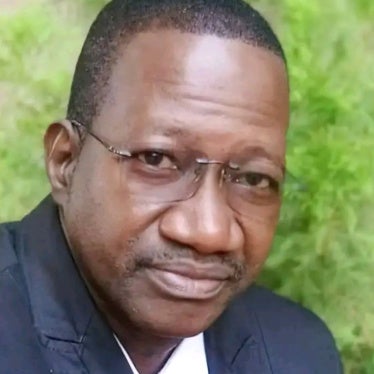(New York, June 29, 2006) - The Nigerian government’s attempt to remove the executive secretary of the country’s National Human Rights Commission (NHRC) appears to be politically motivated and is a serious blow to the independence of the institution, Human Rights Watch said today.
“The government is trying to fire the head of Nigeria’s Human Rights Commission without any justification and without due process,” said Peter Takirambudde, Africa director at Human Rights Watch. “The government’s apparent attempt to muzzle him is at odds with its professed commitment to transparency.”
Human Rights Watch called on the government to reverse the move unless it can offer some convincing public justification for it, and for the Nigerian National Assembly to move quickly with reforms to strengthen the independence of the NHRC.
Bukhari Bello, executive secretary of the NHRC since June 2000, was appointed by the government to a second five-year term just last year. During his tenure in office, Bello has publicly expressed concern about numerous human rights issues, including, on several occasions, the harassment and detention of journalists by government security forces.
On June 16, the commission issued a statement which strongly condemned the detention of Africa Independent Television journalist Mike Gbenga Aruleba. Aruleba had been arrested by State Security Service agents after hosting an on-air discussion about the presidency’s recent purchase of a supposedly new luxury airplane. This issue has been the topic of public controversy following allegations, angrily denied by the presidency, that the airplane was in fact a used one and not new.
In the commission’s statement, Bello characterized Aruleba’s detention as “an infringement on the freedom of expression and the rule of law,” and made reference to “a consistent pattern by security agencies to muzzle the media.” Three days later, Bello received a letter from the Ministry of Justice stating that he was to be reassigned from his position as executive secretary of the NHRC.
Aruleba has since been arraigned on charges of sedition along with Rotimi Durojaiye, a journalist with the Daily Independent newspaper who had been covering the aircraft controversy. Both men face prison terms of up to two years if convicted.
“In speaking out against the ridiculous charges leveled against Mike Aruleba and Rotimi Durojaiye, the commission was doing its job,” said Takirambudde. “These charges show why Nigeria needs its Human Rights Commission to be both outspoken and independent.”
Although neither President Olusegun Obasanjo nor any member of his government has publicly advanced any justification for Bello’s dismissal, Bello told Human Rights Watch that he was informed by the attorney general that his dismissal was the result of Obasanjo’s increasing dissatisfaction with the commission’s criticism of various government policies and actions.
Bello has so far contended that his “reassignment” is ineffective, arguing that it carries no legal force because it was not officially issued by the presidency and because no reason was given for the action. The result has been a stalemate, with Bello refusing to vacate his office at the commission and meetings between the attorney general and the other members of the commission’s governing council scheduled for the end of this week. Nigerian civil society groups have been vocal in demanding that Bello be allowed to retain his position.
“If President Obasanjo sacks the head of the Human Rights Commission like this, he will set a precedent that could destroy the commission,” Takirambudde said. “The president should either give a legitimate reason for removing Bello or stop trying to unseat him.”
The NHRC was established by military decree in 1995 and given the responsibility to investigate, monitor and report on human rights issues throughout Nigeria. Only since the end of military rule in 1999, however, has it begun to make some rather tentative steps toward living up to that ambitious mandate.
Under the terms of the 1995 Human Rights Commission Act, Nigeria’s president has the power to dismiss the commission’s executive secretary or any other member of the commission’s governing council if he is satisfied that “it is not in the interest of the public that the member should remain in office.” This broad discretionary power of dismissal is a relic of the Abacha dictatorship, which sought to ensure that the NHRC could never emerge as a formidable critic of its own policies. The National Assembly has before it, but has not yet passed, legislation that would curtail that discretion.
“The lesson of this debacle is that the commission remains far too vulnerable to the president’s political whims,” Takirambudde said. “The National Assembly should urgently amend the Human Rights Commission Act to bolster the commission’s independence.”







